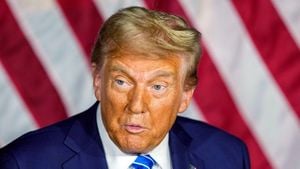The political chessboard of U.S. foreign policy is set to undergo significant shifts as Donald Trump reclaims the presidency, raising questions about the future role of America on the global stage. With Trump’s transactional approach, nations, particularly Taiwan and China, are bracing for repercussions stemming from his anticipated policies.
Trump’s expected return to the Oval Office is more than just political nostalgia; it signals the potential for radical changes affecting not only U.S.-China dynamics but also the complex relations involving Taiwan. Throughout his presidency, Trump displayed an affinity for operating through financial leverage and economic negotiations, forming partnerships by way of military sales and diplomatic favors, which will likely ease the way for Taiwan’s strategic military upgrades. Taiwan, already committed to spending about 2.5% of its GDP on defense, will likely face increased pressure under Trump to bolster its military capabilities even more. Trump has demonstrated this with his previous arms sales during his first term, where notable deals included advanced fighter jets and missile systems worth billions.
The current geopolitical tension cannot be dismissed either, as China’s increasing military assertiveness continues to complicate the status quo. Trump’s transactional dealings may force Taiwan to align closely with U.S. interests, which some view as beneficial for strengthening those ties. But the underlying risks remain formidable. Analysts warn of Trump's unpredictable policies potentially affording Taiwan very little economic stability—and increasing tariffs on imports could throw regional industries out of sync if not handled diplomatically.
Shifting to economics, Taiwan's semiconductor industry looms large. The island has dominant global standing, serving as the backbone of the tech industry; it is also seen as both economically advantageous yet politically risky for fostering dependency with the U.S. The expected dialogue between Trump and Taiwanese leaders over military purchases may very well go hand-in-hand with talks about the semiconductor sector, which provides numerous jobs back home. The fear is if Trump perceives Taiwanese companies as threats to American jobs, he may impose retaliatory measures. Hence, this setup has Taiwan caught between the proverbial rock and hard place as Trump could bundle military support with demands on Taiwan's economic performance.
Interestingly, some analysts still see bright prospects for Taiwan should it successfully adapt to and negotiate with Trump’s administration. Mastering the art of financial diplomacy could allow them to leverage their capabilities to generate more diplomatic support from the U.S. But this cautiously optimistic viewpoint isn’t universally agreed upon. Paradoxically, the very figures who once supported Taiwan during Trump’s previous administration may now be absent from key roles, raising questions about continuity and feasibility.
Every nuance counts: Taiwan will need to deploy proactive measures to navigate these looming uncertainties. Companies, for example, could face pressure to avoid the brunt of rising tariffs and should be preparing flexible plans to cope with potential U.S. trade interruptions. The Taiwanese government is reportedly eyeing offers around $15 billion as they aim to pivot more assertively within the defense market, signifying their commitment to firm up military ties.
This isn’t just about armaments either; the backdrop of conflicting ideologies defines the U.S.-China relationship. Trump has consistently espoused aggressive stances toward China, echoing concerns about their trade practices and national security breaches. The economic downturn witnessed within China, characterized by high youth unemployment, collapsing real estate prices, and declining foreign investments, places the nation at risk during these negotiations.
America, under Trump, may present China with formidable sanctions should they escalate aggression concerning Taiwan, particularly. This strategy aligns with broader attempts to contain Chinese expansionism and promote U.S. interests by protecting its allies like Taiwan against potential overreach.
Yet the specter of volatility and unpredictability looms over American foreign policy, with critics fearing Trump’s return could wreak havoc on multiple fronts. Economists warn any policy shifts could disrupt trade patterns and impact U.S. GDP due to potential retaliatory measures from China if they feel cornered.
The parallel with the Ukraine-Russia conflict serves as another unfortunate reminder of how quickly circumstances can change under Trump's administration, highlighting the need for vigilant oversight and strategic planning. Aimed at solidifying U.S.-Ukraine military support, Trump’s decisions could reflect back on proceedings with Taiwan, potentially foreshadowing parallels or iterations drawn there.
The urgent need for unity among American political leaders—both Republican and Democrat—could give rise to collaborative strategic approaches, allowing for the pairing of Trump’s boldness with Biden’s methodical diplomacy. Such political maneuvering could serve to redefine U.S. foreign relations, balancing strength with requisite caution as global challenges multiply.
With Trump calling the shots again, it's clear the stakes have never been higher. Not only for U.S. interests but also for the delicate geopolitical balance across Asia-Pacific. Taiwan is poised to navigate this newfound turbulence as alliances are tested and both sides weigh their positions, setting the stage for what could be monumental changes within the dynamic of global power.



